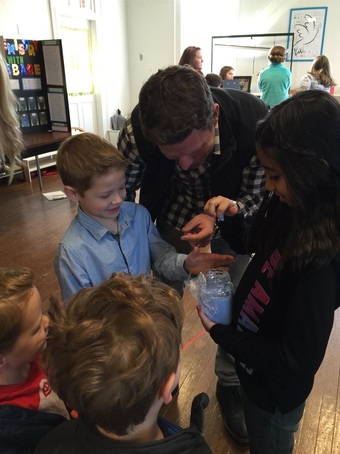
I beamed with pride as Jack led me around his classroom, showing me his favorite work, pointing out his art hanging on the walls. He showed me how he cleans off the table after lunch, gave me a brief lesson on using a hand-loom and brought me up to speed on how ant colonies thrive. Then he took me outside and showed me the compost bin, the garden and how he’s mastered leaping from the top of the monkey bars. This is Montessori. This is what happens when a child learns in an environment that encourages individuality and critical thinking and exploration, teaches them to respect limits, as well as test them.
It wasn’t always like this though. In the 7.5 years that Jack has spent on this earth, he has always been my imaginator, my dreamer, my genius. From the time he was a baby, we could tell he was always thinking, observing, learning. He was always different, a characteristic I relish in him. But at no point was his individuality - and the importance of him being free to express it - more glaringly apparent than when he first started preschool at a local church. Expected to sit still inside all day at 3 years old, with no more than 20 minutes to enjoy the Southern California sunshine, no free time to explore his interests and a teacher who couldn’t make sense of his constant compulsion to move left him frustrated and rebellious, and me anxious and disappointed, wondering where I was going wrong as a mother.
Then I happened upon an article about how today’s schools are basically setting up our boys for failure. Boys are tactile learners who benefit from hands-on experience and physical activity and taking chances and space in which to stretch their imaginations and explore. Modern-day schools are essentially ignoring thousands of years of innate male biology by requiring them to sit still for hours at a time, cutting down on (or eliminating entirely) their daily physical activity, expecting them to master language- and reading-based skills as early and quickly as their female classmates, tasking them only with lessons that require sedentary focus and hours of nightly homework that preclude them even further from getting any free time outside. I had a moment of clarity. The clouds parted. Jack wasn’t a bad seed, and I wasn’t a failed mother. We just needed to find a school that fit him, not force him to conform to a system that ultimately fails to address his needs.
Which is how we ended up here at LifeSong Montessori. We had just moved to town, and I already knew from my extensive research that Montessori is where I wanted Jack to be. And we’ve never looked back. I am now a proud Montessori parent, and with that territory inevitably comes one particular question from friends and acquaintances who just don’t get it: “Well, Montessori is fine for preschool, but when are you going to make the transition to a real school?”
Allow me to show you the “real” Montessori, and exactly what it has to offer to our children.
A central tenet of Montessori is fostering a child’s independence - independence in doing things for themselves, independence in being free to explore, independence in pursuing their interests and passions. Montessori students still learn everything they need to know to compete academically, but in such a way that they’re not simply filling in worksheets and going through the motions. They’re learning in a way that excites them, that piques their curiosity, that compels them to discover more.
Math isn’t simply abstract numbers on a page; it’s strings of golden beads they can see and touch. Geography isn’t just memorizing the capitols of places they’ll never see; it’s puzzles of the world and in-depth immersion in other cultures through activities like International Night. Handwriting isn’t simply a myriad of lined worksheets where children write letters over and over; it’s sandpaper letters that compel them to touch and trace with their little fingers, inadvertently committing the motion to memory. Science isn’t just reading from a textbook; it’s watching food scraps come full-circle as they turn into rich compost, and nurturing a seedling into a plant. And on top of all that, they’re learning practical skills they’ll use on a daily basis throughout their lives, skills that will ensure they’re responsible, well-rounded, conscientious and capable members of society.
The school-snack program teaches Jack about meal-planning, healthy food choices, budgeting and grocery shopping when he has to work with his class to plan out the weekly menu, calculate the money allotment and shop for the groceries. He knows from his class-garden experience how to grow his own food, from seed to plant. He knows that if he finishes his required work for the week, he earns free time, a level of responsibility that encourages independence and teaches him about time management. He and his classmates don’t have issues with bullying, because they’re all too busy learning about compassion for all living things through caring for their class pets. Jack has discovered through his classroom looming that he has a talent for weaving, and he looks forward to learning to sew. At home, he cleans up his dishes after each meal and sweeps up the floor beneath his seat, because his teachers expect no less of him at school. At the age of 6, he gained invaluable experience in what it takes to run a company, as he and his classmates built a lemonade-stand business from the ground up. In a few years, he’ll take his work experience one step further by participating in the adolescent-class internship program.
Montessori classes are grouped in such a way that older kids are learning side-by-side with younger kids, instilling empathy, patience and confidence in those acting as role models, while providing guidance and leadership for the more inexperienced students.
Montessori works for Jack because it allows him to express and nurture the quirks and characteristics that make him Jack, challenging and fulfilling him in ways conventional school could not. He’s encouraged to stand out and ask questions and forge his own path through critical thinking and creativity. Can you imagine the kind of world we could create for future generations if all of our schools adopted these principles?? Jack is excited to go to school each day, and I have the privilege of watching my precious first-born son blossom into the young man he wants to be, all because Montessori has given him the space to spread his wings, so that he may teach himself to fly.
Sounds pretty real to me.
Written by Katy Allen, Montessori mom of three active and enthusiastic LifeSong boys

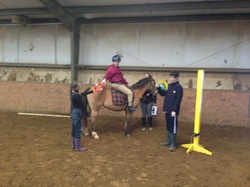
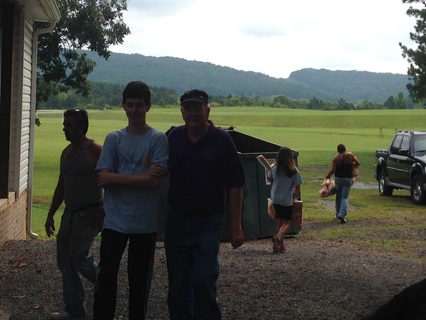
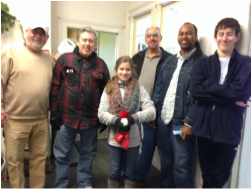
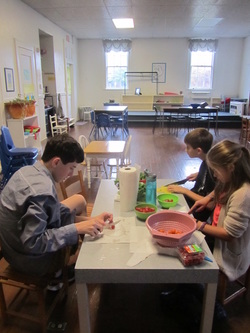
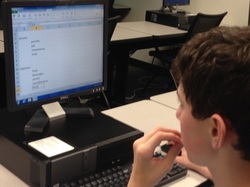
 RSS Feed
RSS Feed